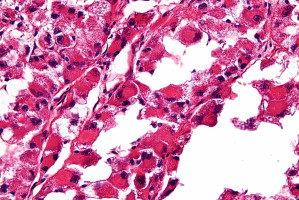
The European Commission (EC) has granted conditional marketing authorisation for olaratumab injection, 10 mg/mL, in combination with doxorubicin, to treat adults with advanced soft tissue sarcoma (STS) for whom curative surgery or radiotherapy is not suitable, and who have not been previously treated with doxorubicin.
More than 3,000 new cases are diagnosed in the UK every year.
Olaratumab is a recombinant human immunoglobulin G subclass 1 (IgG1) monoclonal antibody that specifically binds PDGFRα, blocking PDGF-AA, PDGF-BB, and PDGF-CC binding and receptor activation.
Preclinical studies of olaratumab alone or in combination with doxorubicin have shown antitumour activity in human sarcoma xenograft models.
Based on these preclinical data and the rationale for disrupting PDGF and PDGFR signalling in sarcoma cells and the tumour or stromal microenvironment, the phase 1b and randomised phase 2 study assessed the safety and efficacy of adding olaratumab to doxorubicin in patients with advanced soft-tissue sarcoma.
Soft tissue sarcomas account for around one in every 100 cancers diagnosed in the UK.
The open-label, randomised Phase 1b/2 study, JGDG, compared olaratumab in combination with doxorubicin chemotherapy to the control arm of doxorubicin alone in patients with unresectable, advanced STS not amenable to curative treatment with surgery or radiotherapy.
After confirmation of safety in the Phase 1b portion of the study, 133 doxorubicin-naïve patients were randomised 1:1 in the Phase 2 portion of the study.
Results were published in The Lancet.
A total of 66 patients were treated on the olaratumab-doxorubicin arm, and 67 on the control doxorubicin arm.
The primary endpoint of the study was progression free survival (PFS).
Key secondary endpoints included overall survival (OS) and objective response rate (ORR).
Randomisation was balanced by ECOG performance status, histological tumour type, immunohistochemical PDGFR expression and previous lines of treatment.
The most common treatment-emergent events wtih olaratumab plus doxorubicin in the phase 2 portion of the trial were nausea, fatigue, neutropenia and mucositis, and with doxorubicin there were fatigue, nausea, alopecia and neutropenia.
The most common (greater than 5 percent incidence) grade 3 or higher adverse events identified in the study were neutropenia (53 percent on the olaratumab combination arm vs. 33 percent on the control doxorubicin arm), anaemia (13 percent vs. 9 percent), fatigue (9 percent vs. 3 percent) and musculoskeletal pain (7.8 percent vs. 1.5 percent).
There were no increases in febrile neutropenia (13 percent on the olaratumab- doxorubicin arm vs. 14 percent on the control doxorubicin arm), infections (8 percent vs. 11 percent) and patient discontinuations (7 percent vs. 13 percent).
Grade 3 or higher infusion- related reactions occurred in 3 percent of patients on the olaratumab-doxorubicin arm vs. 0 percent on the control doxorubicin arm.
"Olaratumab, in combination with doxorubicin, has demonstrated improved overall survival compared to doxorubicin alone in advanced soft tissue sarcomas, and is a promising new agent in these tumours,” said Dr. Robin L. Jones, BSc, MB, MRCP, M.D., Consultant Medical Oncologist and Head of the Sarcoma Unit at The Royal Marsden and Team Leader at The Institute of Cancer Research in London, and an investigator of the JGDG registration trial.
“With this decision, olaratumab is now authorised for use in the EU, offering a new treatment option for soft tissue sarcoma patients in Europe,” said Sue Mahony, Ph.D., Lilly senior vice president and president of Lilly Oncology. “This news further reinforces Lilly’s ongoing commitment toward these types of rare diseases and the patients that are affected around the globe.”
This conditional marketing authorisation is based on data from the Phase 2 portion of the pivotal JGDG trial and followed a positive recommendation from the Committee for Medicinal Products for Human Use (CHMP), who reviewed olaratumab under the European Medicines Agency’s accelerated assessment programme.
The EMA previously granted olaratumab with Orphan Drug Designation for the treatment of advanced soft tissue sarcoma in the EU.
As part of a conditional marketing authorisation, Lilly will need to provide results from an ongoing Phase 3 study.
This study, ANNOUNCE, has fully enrolled and follow up is underway.
Until availability of the full data, the CHMP will review the benefits and risks of olaratumab annually to determine whether the conditional marketing authorisation can be maintained.
The Phase 3 trial of Olaratumab and doxorubicin in advanced STS, ANNOUNCE has fully enrolled .
This is the first marketing authorisation for olaratumab in Europe and follows U.S. Food and Drug Administration (FDA) approval on 19 October 2016.
Source: The Lancet